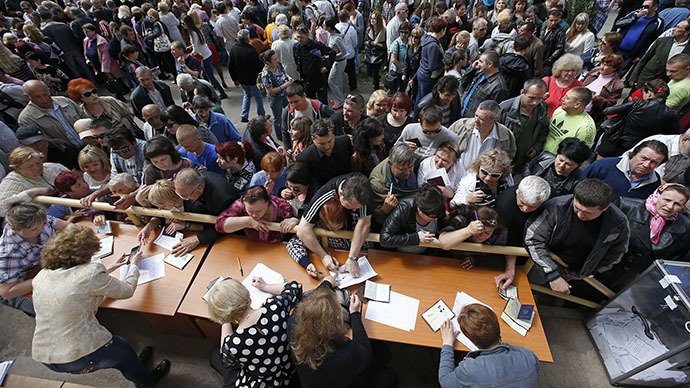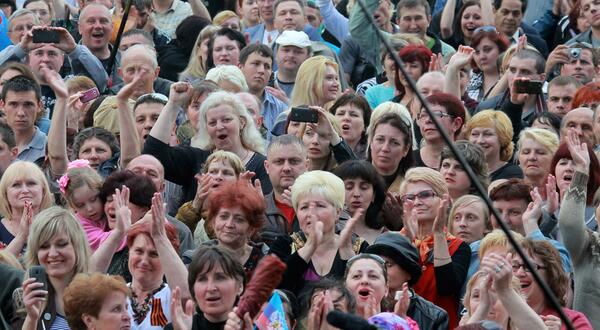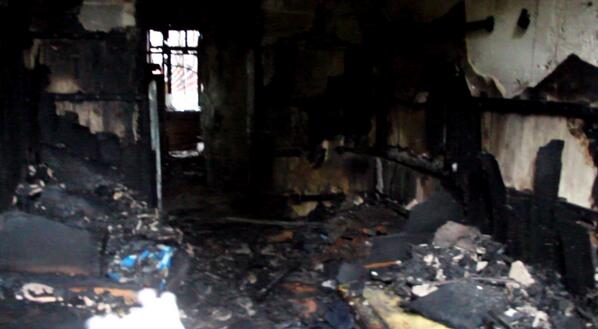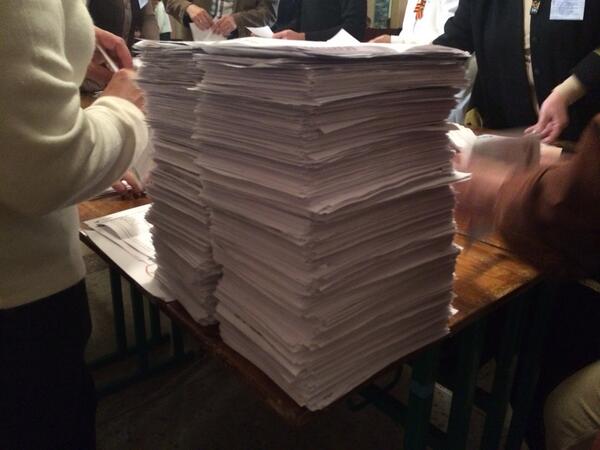http://rt.com/news/eastern-ukraine-army-operation-680/
http://www.zerohedge.com/news/2014-05-12/donetsk-warns-ukraine-army-located-east-leave-48-hours-or-face-war
http://www.zerohedge.com/news/2014-05-12/russia-demands-immediate-talks-kiev-says-refereda-show-real-mood-people
Itar Tass
http://rt.com/news/158276-referendum-results-east-ukraine/
Kiev intensifies military op in Eastern Ukraine LIVE UPDATES
The coup-imposed authorities in Kiev are continuing their crackdown on anti-government activists following pro-autonomy referendums in Ukraine's Donetsk and Lugansk regions. The unrest in the country's southeast has already resulted in dozens of deaths.
Monday, May 12
23:25 GMT:
United Nations Secretary-General Ban Ki-moonsaid Monday that despite recent tumult, “there is still time to halt the descent of Ukraine into full-blown conflict.”
“Over the past weeks, there has been much violence and little dialogue,” Ban said from UN Headquarters. “I call on all those who have sought to undermine Ukraine’s unity, territorial integrity and stability to immediately cease such actions."
“The authorities in Kiev must also continue to respond to such acts with maximum restraint and within the parameters of Ukrainian law and international human rights principles,” he added.
21:40 GMT:
Russia expressed disappointment over the EU’s newly imposed sanctions against Russia. “Instead of trying to solve the situation through de-escalation, disarmament of the Right Sector, improvement of dialogue between Kiev’s authorities and Ukrainian regions, EU colleagues are demonstrating a one-sided and one-dimensional policy, not worthy of the European Union,”Itar-Tass quoted Deputy Foreign Minister Sergey Ryabkov as saying.
19:43 GMT:
The chief prosecutor of Crimea and Internet sensation Natalia Poklonskaya as well as her colleague from Sevastopol, Igor Shevchenko, have been banned entry to the European Union, as the bloc introduced Monday additional sanctions over the Ukraine crisis.
Among the other 13 people blacklisted by the EU, is the deputy head of the presidential administration, Vyacheslav Volodin, the Commander of airborne troops Vladimir Shamanov, State Duma deputy Vladimir Pligin, four Crimean administration chiefs and six pro-autonomy activists in eastern Ukraine, reports Itar-Tass. The sanctions also target two Crimean entities.
19:41 GMT:
Kiev has applied to London for non-lethal military aid, the British Defense Secretary Philip Hammond has confirmed speaking in the House of Commons, as cited by Itar-Tass. He said the request was sent because of a lack of radio sets, bulletproof vests and sleeping bags in the Ukrainian army, adding that London is currently considering how to respond.
19:39 GMT:
The EU should respect the results of the referendum in Lugansk and Donetsk and to contribute to fulfilling peoples’ will within the framework of a dialogue between Kiev, Donetsk and Lugansk, Russia’s Foreign Ministry said.
The decisions on Ukraine by the EU Council cause deep bewilderment as the bloc continues issuing statements that do not correspond with reality, the Ministry added.
“It is time for Brussels to stop looking at a significant part of Ukrainian people, who do not accept Kiev government, as ‘pro-Russian separatists’ and understand that without recognizing the inner nature of the deep Ukrainian conflict it will be impossible to solve it,” the statement said.
19:25 GMT:
19:14 GMT:
Kiev troops have launched an assault on the eastern Ukrainian city of Slavyansk, a stronghold of anti-government activists, local self-defense says.
“Slavyansk is being bombarded from several sides, we have information that the adversaries are using heavy mortars,” a self-defense HQ spokesperson told Interfax.
Mobile communications have also been disrupted in the city, the agency says.
18:59 GMT:
NATO “is considering further steps” to deter Russia, if necessary, NATO Secretary General Anders Fogh Rasmussen told CNN.
“Those further steps might include an update of existing defense plans, development of new defense plans, enhanced exercises, and also appropriate deployment,” he told CNN’s Christiane Amanpour.
At the same time, he said it was “a bit too early” to tell exactly how and where to do it, “but we will not hesitate to take further steps if needed.”
18:25 GMT:
The Russian president and the head of the Organization for Security and Cooperation in Europe (OSCE) have discussed the situation in Ukraine on the phone, the Kremlin press-service reports.
Vladimir Putin and Didier Burkhalter agreed that the OSCE should intensify its efforts aimed at a settlement of the crisis, by fostering direct dialogue between Kiev’s authorities and the protesters in the southeastern regions.
18:10 GMT:
German leftwing leader, Gregor Gysi, has called for an international commission to probe the events on Kiev’s Maidan Square and in Odessa. The German politician believes the settlement of the Ukrainian crisis will only come with the country’s federalization. “I can’t see any other real way out of this situation,” he said, after talks with Vice Speaker of the Russian Federation Council Ilyas Umakhanov.
Focusing on relations between Russia and NATO he said “I understand that the West wants Russia to pull back its troops still further from Ukrainian borders, but then NATO itself must not deploy troops and planes closer and closer to Russian borders,” he said.
He also said that imposing sanctions against Russia was a mistake, adding, “Europe will never feel safe without Russia.”
17:34 GMT:
The Russian Foreign Ministry has demanded Kiev officials provide an explanation for the Ukrainian border control’s decision not to let the head of External Church Relations, Metropolitan Illarion, to enter the country on May 9. It also demanded an apology from Ukraine. The ministry called it an “unprecedented and provocative act.” The incident happened in the city of Dnepropetrovsk, when Metropolitan Illarion arrived to congratulate the Metropolitan Irenaios on his 75th birthday. However, he was detained upon arrival and issued a written notice forbidding entrance to Ukraine. No reasons for the decision were given.
17:11 GMT:
Lugansk has demanded Kiev make changes in Ukraine’s constitution “that would make the process of federalization possible” as the people’s referendum in the Lugansk region demands, the local regional council said in a statement.
"An absolute majority has voted for the right to determine our future,” the paper said, adding that in the current situation this is the only possible way and “the only chance” to save Ukraine.
Otherwise, the Lugansk Regional Council warned, the responsibility for separating the country“would lie on Kiev.”
Lugasnk officials demanded the immediate cessation of Kiev’s military operation, which “in fact is a crackdown on protests.”
It also wants an “immediate” implementation of “another major decision of principal” – making the Russian language a state language in the Lugansk People’s Republic.
16:35 GMT:
16:27 GMT:
The implementation of the referendums’ results in the Donetsk and Lugansk regions should be completed within the framework of a dialogue between Kiev, Donetsk and Lugansk, Russia’s Foreign Ministry said in a statement.
The ministry reiterated the necessity of “immediate” discussion on Ukraine’s fate, involving “all political forces and regions of the country.”
“We are awaiting Kiev’s official actions, not general declarations about their intentions, and urgent effective meetings with representatives of southern and eastern Ukraine, which would lead to a stabilization of the situation in the country,” the statement reads.
However, it also pointed out that Kiev still “demonstrates criminal unwillingness to hold a dialogue with its people.”
16:14 GMT:
The People’s Republics of Donetsk and Lugansk want “to continue their way together,” the Donetsk People’s Republic speaker Vladimir Makovin said.
“We now have a right to use our freedom the way we think is correct,” he said, adding that “they have already heard offers about a joint future” from Lugansk.
13:06 GMT:
The Ukrainian Border Service is to receive extra help from the US Ministry of Defense to the tune of seven million dollars to help secure the country’s borders, according to the press service of the Ukrainian Border Service, as reports RIA Novosti. “Around three million dollars will be used to support state personnel with the Ukrainian Border Service to help them fulfill their duties on the country’s borders,” the Border Service added, with some of it going to purchase tents and generators. Another four million dollars will be allocated to buying equipment for the Border Service to help them improve their performance, such as improving communications.
13:01 GMT:
12:30 GMT:
A faction of the Party of Regions in the Ukrainian parliament will appeal to different international courts to bring attention to the killing of peaceful citizens in the South East of the country and ask that those who committed the acts be brought to justice, ITAR-TASS reports. Aleksandr Efremov, who is a spokesman for the faction said, “It is unprecedented for Ukraine to have experienced so many people dying every day. Therefore we are going to address international courts to make those who used the army against their own peaceful citizens accountable for their actions.” Efremov added that “These military operations in which peaceful citizens are killed can only be described as a war crime.”
11:53 GMT:
EU foreign ministers have expanded their sanctions over Russia's actions in Ukraine, adding two Crimean companies and 13 people to the bloc's blacklist, EU diplomats said, according to Reuters.
The sanctions will come into effect Tuesday. Earlier, 48 Russians and Ukrainians were targeted by EU asset freezes and visa bans over Crimea joining Russia in March.
11:44 GMT:
OSCE Chairperson-in-Office and Swiss President Didier Burkhalter described the referendums in eastern Ukraine as “incompatible with the Ukrainian constitution and therefore illegal.”
“Such provocative actions must be avoided,” Burkhalter said at a meeting of EU ministers in Brussels on Monday.
“Such provocative actions must be avoided,” Burkhalter said at a meeting of EU ministers in Brussels on Monday.
http://www.zerohedge.com/news/2014-05-12/donetsk-warns-ukraine-army-located-east-leave-48-hours-or-face-war
Donetsk Warns Ukraine Army Located In The East To "Leave In 48 Hours" Or Face War
Submitted by Tyler Durden on 05/12/2014 14:37 -0400
Update: And just to make sure Russia has a catalyst:
- UKRAINE FORCES ATTACK EASTERN CITY OF SLOVYANSK, INTERFAX SAYS
* * *
With the US having voiced its support for Ukraine's "anti-terrorist" operations, and Russia strongly supportive of pro-Russian people's decisions to regional self-determination, the threats coming from the newly independent regions are a concern (that markets clearly do not care about):
- DONETSK ARMY SAYS WILL FIGHT UKRAINE FORCES IF DEADLINE IGNORED
Ukrainian military forces have 48 hours to leave the region or Donetsk own "anti-terrorist" forces will fight. Of course, with the US already saying the referendums are illegal and not recognizing them, we suspect it will be time for more sanctions soon (despite the lessons below).
Insurgent group army of so-called Donetsk People’s Republic “will start its own anti-terrorist operation in Donetsk region” against Ukrainian military forces if they don’t heed seperatist army chief Igor Girkin’s 48-hour ultimatum to leave or obey him, head of seperatist group, Denis Pushilin, says by phone.
So... buy stocks?
And a different perspective on which the western approach to resolving the Ukraine crisis may not be exactly "working."
1. Don’t overreach. Policymakers should avoid inflated expectations of what sanctions can accomplish. Sanctions seldom impair the military potential or change the policies of an important targeted power. Modest goals contribute to successful outcomes. Thus it may make more sense to achieve the modest goal of thwarting an impending invasion of Eastern Ukraine than to try to reverse the fait accompli of Russia’s annexation of Crimea.
2. Russian economic integration with the West is an advantage. Economic sanctions are most effective when aimed against close trading partners with more to lose.
3. Don’t count on Russian public opinion. It is hard to “bully a bully” with economic measures. Democratic regimes are more susceptible to economic pressure than autocratic regimes like Russia.
4. Slam the hammer; don’t turn the screw. Economic sanctions are best deployed with maximum impact. Gradually imposed steps may simply strengthen the target national government’s resolve. In the present case, threatening very heavy sanctions if Russian armed forces cross the Ukrainian border has the best chance of deterrence.
5. International cooperation is not always essential, but in the case of Russia, it probably is. A large coalition of sanctioning countries does not necessarily make the sanctions highly likely to succeed. Financial sanctions against Iran, on the other hand, succeeded in large part because they were backed by an international coalition of countries willing to forgo Iranian oil imports and dealings with Iranian banks. To be sure, the effort to gain international support can dilute their scope. But the United States has little choice but to gain the cooperation of Western Europe in this case.
6. Choose the right tool. Sanctions deployed in conjunction with other measures, such as covert action or military operations, increase chances of success. So far, the United States has been reluctant to provide substantial military assistance to Ukraine, out of concern that Russia will escalate its own intervention. Instead, the military dimension of US support has been limited to greater assistance to NATO allies in the region, especially Poland.
7. Don’t be a cheapskate or spendthrift. Sanctioning governments must balance the benefits against the costs borne domestically to sustain public support at home. At present, the United States, but especially Europe, are facing the resistance of major business firms over the possibility of severe energy and financial sanctions.
8. Look before you leap. Sanctioning governments should weigh their means and objectives against unintended costs and consequences. In the Ukrainian case, all signs indicate that President Obama and his European counterparts (especially Chancellor Angela Merkel of Germany) are giving each step of the sanctions regime their carefully guarded attention.
http://www.zerohedge.com/news/2014-05-12/russia-demands-immediate-talks-kiev-says-refereda-show-real-mood-people
Russia Demands "Immediate Talks" With Kiev; Says Referendums Show "Real Mood" Of People
Submitted by Tyler Durden on 05/12/2014 12:29 -0400
UPDATE: AP reports Pro-Russian protesters declare independence for the Luhansk region in eastern Ukraine.
With local reporters citing officials claiming "direct talks between the eastern regions of Ukraine and Kiev are now out of the question", Russia's foreign ministry has commented directly that:
- *RUSSIA SAYS SEPARATIST REFERENDUMS SHOW 'REAL MOOD' IN EAST
- *RUSSIA EXPECTS KIEV GOVT TO REACH OUT TO EAST, WANTS 'RESULTS'
Adding that the Dontesk and Lugansk referenda short evidence of the people's strong will to make decisions on their own,Russia wants "immediate" talks in Ukraine on state governance... and cites Kiev's criminal unwillingness to engage in dialogue with his people.
Local officials do not seem too hopeful of direct talks...
Itar Tass
http://rt.com/news/158276-referendum-results-east-ukraine/
Referendum results in Donetsk and Lugansk Regions show landslide support for self-rule
The results of referendums have been announced in Donetsk and Lugansk Regions, showing the majority of voters support self-rule, amid an intensified military operation by Kiev which resulted in several deaths.
Follow RT's LIVE UPDATES on Eastern Ukraine
Almost 90 percent of voters in Donetsk Region have endorsed political independence from Kiev, the head of the Central Election Commission of the self-proclaimed ‘Donetsk People’s Republic’, Roman Lyagin, announced.
“Counting the ballots proved to be surprisingly easy – the number of people who said ‘no’ was relatively small and there appeared to be only a tiny proportion of spoiled ballots, so we managed to carry out counting quite fast. The figures are as follows: 89.07 percent voted ‘for’, 10.19 percent voted ‘against’ and 0.74 percent of ballots were rendered ineligible,” Lyagin told journalists.
“Counting the ballots proved to be surprisingly easy – the number of people who said ‘no’ was relatively small and there appeared to be only a tiny proportion of spoiled ballots, so we managed to carry out counting quite fast. The figures are as follows: 89.07 percent voted ‘for’, 10.19 percent voted ‘against’ and 0.74 percent of ballots were rendered ineligible,” Lyagin told journalists.
In Lugansk Region 96.2 percent of voters supported the region’s self-rule, according to the final figures announced by the local election commission.










Aloha,
ReplyDeleteFrom above "Ukraine situation posing possible threat to global economy ,IMF says"
Lagarde -" Already now the geopolitical situation was influencing global trade,flows of capitals and ENERGY security in Europe"
http://en.itar-tass.com/world/731230
And how do the EU markets react Monday? Green green green ... "EU shares to fresh six year high"
http://www.reuters.com/article/2014/05/12/markets-europe-stocks-idUSL6N0NY2BC20140512
Awesome ;-)
NW
And on the news "Ukraine situ threat to global economy", threatning EU energy security ,US stock go green green green to new record(er) highs :
ReplyDeletehttp://www.zerohedge.com/news/2014-05-12/vix-slammed-11-handle-sends-dow-record-er-high
Awesome ;-)
NW